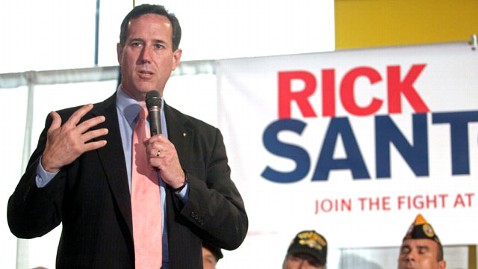Rick Santorum Defends Call for Puerto Rico to Adopt English After Delegate Defection

Image credit: Dennis M. Rivera Pichardo/AP Photo
ABC News' Matthew Jaffe and Shushannah Walshe report:
Rick Santorum Wednesday became the first Republican presidential hopeful in this election to visit Puerto Rico before the island commonwealth's Sunday primary, taking a controversial stand on statehood that he was forced to defend this morning after losing a key supporter.
Rather than boost his standing, the trip has ignited a firestorm with Santorum's comment that English would have to be "the main language" in order for Puerto Rico to become a U.S. state.
"Like in every other state, it [must comply] with this and every other federal law,- and that is that English should be the main language," Santorum said in an interview with the El Vocero newspaper Wednesday. "There are other states with more than one language, as is the case with Hawaii, but to be a state of the U.S., English should be the main language."
The question of statehood is a huge issue in Puerto Rico, which is set to vote on the matter in November. The island's voters will have a referendum on whether to become a state, something some Puerto Ricans favor and others oppose, whether they be in favor of remaining a commonwealth or becoming independent.
Santorum's comments left one of his supporters, Oreste Ramos, so upset that the former Puerto Rican senator rescinded his endorsement.
"Although such a requirement would be unconstitutional, and also would clash with our sociological and linguistic reality, as a question of principle I cannot back a person who holds that position," Oreste said, according to El Vocero. "As a Puerto Rican and Spanish-speaking U.S. citizen, I consider the position of Mr. Santorum offensive."
Santorum's deputy chairman in Puerto Rico tried to explain away Ramos' defection by claiming that his gripes have more to do with Santorum's stance on statehood than specifically with the English-language issue, and that it is too late for Ramos to remove his name as a delegate for Santorum.
Santorum himself today defended his English-language comments as he was exiting a special-needs school in San Juan with his wife, Karen, and five of their seven children.
"What I said is English has to be learned as a language and this has to be a country where English is widely spoken and used, yes," Santorum told reporters, stating that the use of English should be a "condition" if Puerto Rico is to become a state. The island, he said, "needs to be a bilingual country, not just a Spanish speaking country."
"I think English and Spanish - obviously Spanish is going to be spoken here on the island - but this needs to be a bilingual country, not just a Spanish-speaking country, and right now it is overwhelmingly just Spanish speaking. But it needs to have, in order to fully integrate into American society, English has to be a language that is spoken here also and spoken universally," Santorum explained.
"I think that would be a condition. I think it's important. And I think if you talk to most parents, they want their children to learn English. It is essential for children in America to be able to speak English to fully integrate and have full opportunities," he added. "I don't think we're doing any more than, you know, people who come to America on the mainland. We're not doing them any favors by not teaching them English.
Puerto Rico considers English and Spanish its official languages, but Spanish is more frequently used. With the island's primary only three days away, Santorum - already the underdog there - can ill afford to alienate supporters. Republican front-runner Mitt Romney is the favorite in the commonwealth, and the former Massachusetts governor enjoys the backing of Puerto Rico Gov. Luis Fortuno. If Romney, or any other candidate, wins more than 50 percent of the vote Sunday, then he will take 20 of the island's 23 delegates. That leaves three super delegates, and two have already endorsed Romney.
Santorum met with Fortuno in San Juan Wednesday, explaining away the governor's support for Romney by noting that "the establishment across America lined up behind Gov. Romney very early on and I certainly respect that."
At the same time, Santorum tried to emphasize his ties to the island, noting that he was once referred to as "Senador Puertorriqueno."
"I was referred to by many in my state as Senador Puertorriqueno," he told reporters. "They used to make fun of me: 'Why are you representing Puerto Rico?'
"Well, someone has to because they don't have a voice. I felt a responsibility to the island."
But such comments garnered far less attention than his call for English to be the "main language" there. Romney, for his part, is scheduled to arrive on the island Friday, hoping the visit goes far better than Santorum's has.
There is plenty at stake for both candidates come Sunday, and every misstep, as evidenced by Santorum's stop there, comes with potentially significant consequences.
Matthew Jaffe is covering the 2012 campaign for ABC News and Univision.